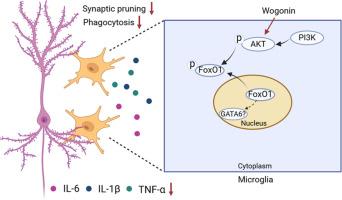沃格宁可减轻小胶质细胞介导的突触过度分枝和癫痫后的认知障碍。
IF 6.7
1区 医学
Q1 CHEMISTRY, MEDICINAL
引用次数: 0
摘要
背景:癫痫是一种神经系统疾病,其特征是神经元反复异常放电,导致大脑功能障碍,给患者带来巨大的心理和经济负担。小胶质细胞是中枢神经系统(CNS)内的常驻免疫细胞,在维持中枢神经系统平衡方面发挥着至关重要的作用。然而,活化的小胶质细胞会过度修剪突触,加剧癫痫后的神经元损伤和认知功能障碍。黄芩中的一种黄酮类化合物沃格宁通过抗炎和抗氧化机制具有已知的神经保护作用,但它对癫痫后神经元中小胶质细胞活化和突触修剪的影响仍不清楚:方法: 使用突触前标记物 Synaptophysin 和突触后标记物 Psd-95 评估突触密度,使用荧光微球评估小胶质细胞的吞噬作用。利用匹洛卡品诱导的状态性癫痫小鼠模型来评估腹腔注射沃戈宁(50 和 100 毫克/千克)后小鼠海马突触密度的变化。随后使用Y迷宫、物体识别和莫里斯水迷宫测试评估了小鼠的记忆和认知功能。采用单细胞测序法研究小胶质细胞状态改变的根本原因,然后进行实验验证:结果:癫痫发生后,小胶质细胞转入活化状态,吞噬能力明显增强。相应地,神经元中突触素和 Psd-95 的水平明显降低。用乌戈宁(100 毫克/千克)治疗癫痫小鼠,可明显增加神经元突触密度,改善学习和记忆障碍。进一步研究发现,沃格宁可通过激活 AKT/FoxO1 通路抑制促炎细胞因子的释放和小胶质细胞的突触吞噬作用:结论:沃戈宁能缓解小胶质细胞对癫痫神经元的过度突触修剪,并通过AKT/FoxO1途径改善癫痫小鼠的认知功能障碍。本文章由计算机程序翻译,如有差异,请以英文原文为准。

Wogonin mitigates microglia-mediated synaptic over-pruning and cognitive impairment following epilepsy
Background
Epilepsy, a neurological disorder characterized by recurrent abnormal neuronal discharges, leading to brain dysfunction and imposing significant psychological and economic burdens on patients. Microglia, the resident immune cells within the central nervous system (CNS), play a crucial role in maintaining CNS homeostasis. However, activated microglia can excessively prune synapses, exacerbating neuronal damage and cognitive dysfunction following epilepsy. Wogonin, a flavonoid from Scutellaria Baicalensis, has known neuroprotective effects via anti-inflammatory and antioxidative mechanisms, but its impact on microglial activation and synaptic pruning in neurons post-epilepsy remains unclear.
Methods
Synaptic density was assessed using presynaptic marker Synaptophysin and postsynaptic marker Psd-95, and microglial phagocytosis was evaluated with fluorescent microspheres. Pilocarpine-induced mouse model of status epilepticus was used to evaluate synaptic density changes of mouse hippocampus following an intraperitoneal injection of wogonin (50 and 100 mg/kg). Memory and cognitive function in mice were subsequently evaluated using the Y-maze, object recognition, and Morris water maze tests. Single-cell sequencing was employed to investigate the underlying causes of microglial state alterations, followed by experimental validation.
Results
Microglia were transitioned to an activated state post-epilepsy, exhibiting significantly enhanced phagocytic capacity. Correspondingly, levels of synaptophysin and Psd-95 were markedly reduced in neurons. Treatment with wogonin (100 mg/kg) significantly increased neuronal synaptic density and improved learning and memory deficits in epileptic mice. Further investigation revealed that wogonin inhibits the release of pro-inflammatory cytokines and synaptic phagocytosis of microglia by activating the AKT/FoxO1 pathway.
Conclusions
Wogonin could alleviate excessive synaptic pruning of epileptic neurons by microglia and improve cognitive dysfunction of epileptic mice via the AKT/FoxO1 pathway.
求助全文
通过发布文献求助,成功后即可免费获取论文全文。
去求助
来源期刊

Phytomedicine
医学-药学
CiteScore
10.30
自引率
5.10%
发文量
670
审稿时长
91 days
期刊介绍:
Phytomedicine is a therapy-oriented journal that publishes innovative studies on the efficacy, safety, quality, and mechanisms of action of specified plant extracts, phytopharmaceuticals, and their isolated constituents. This includes clinical, pharmacological, pharmacokinetic, and toxicological studies of herbal medicinal products, preparations, and purified compounds with defined and consistent quality, ensuring reproducible pharmacological activity. Founded in 1994, Phytomedicine aims to focus and stimulate research in this field and establish internationally accepted scientific standards for pharmacological studies, proof of clinical efficacy, and safety of phytomedicines.
 求助内容:
求助内容: 应助结果提醒方式:
应助结果提醒方式:


